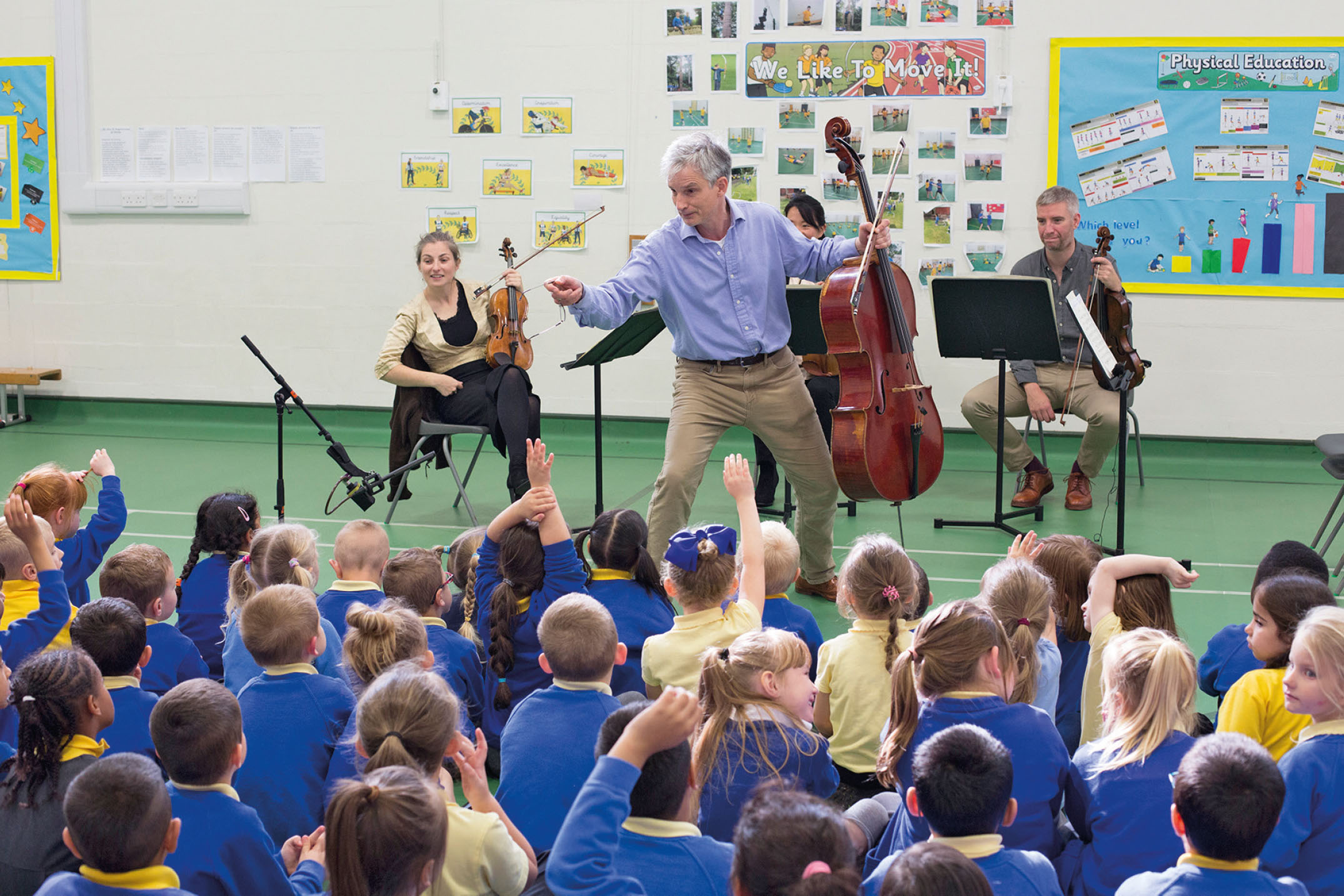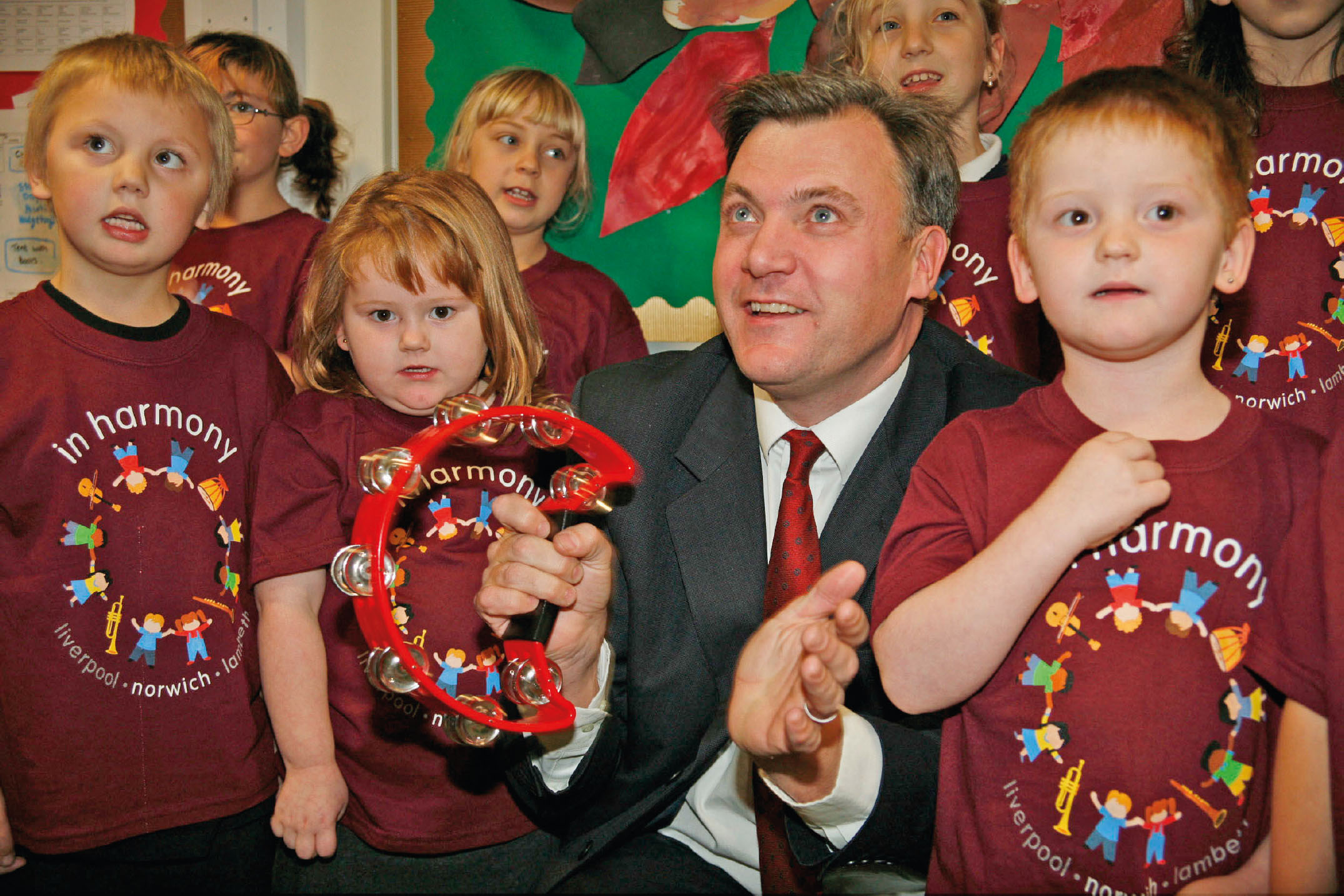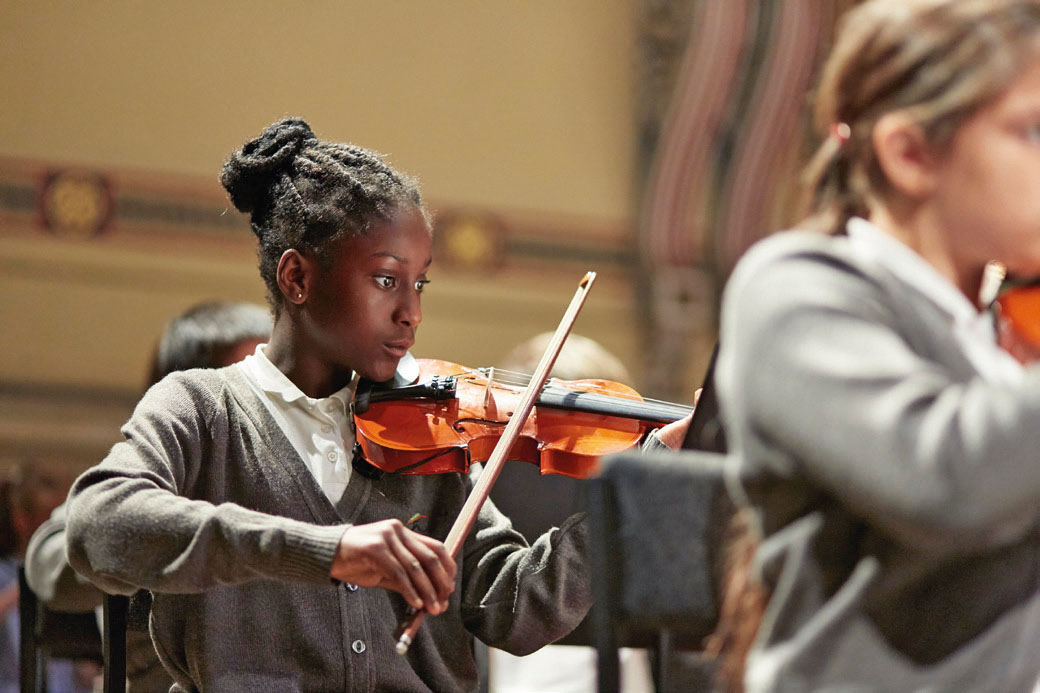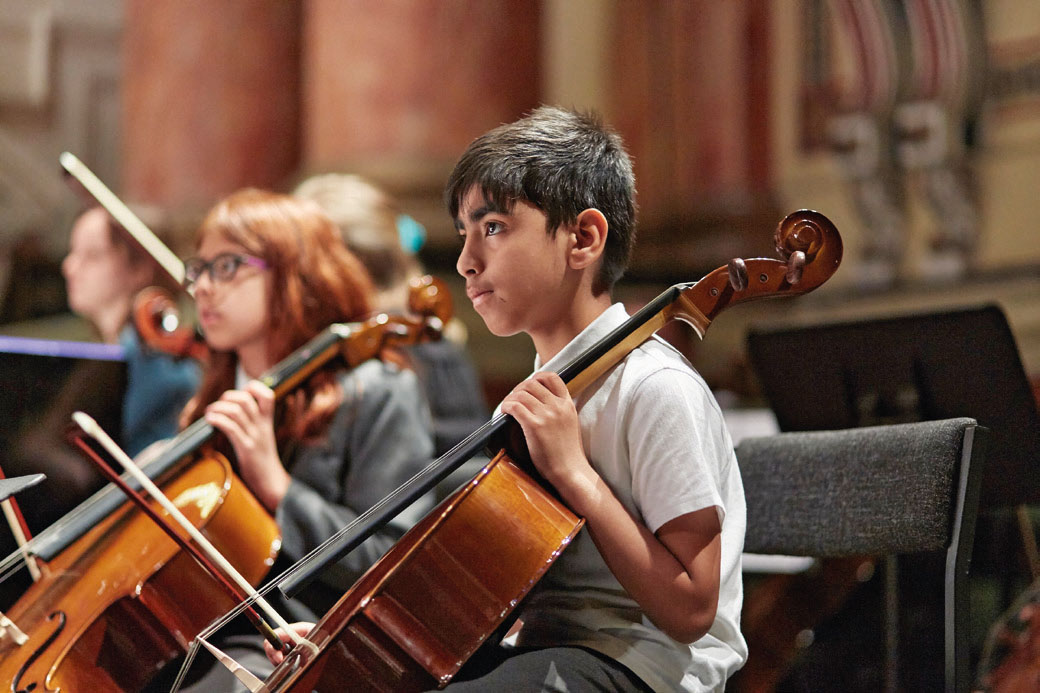
There have been many memorable Proms in recent years – David Attenborough playing a floor polisher while pianist Stephen Hough and violinist Jennifer Pike slid on-stage with vacuum cleaners in Malcolm Arnold's A Grand, Grand Overture, for instance. But the sight of the Simón Bolívar youth orchestra of Venezuela swapping their concert dress for jackets in their national colours of yellow, blue and red before going on to perform exuberant encores seemed to capture the nation's imagination. This was back in 2007, when Brexit was but a twinkle in Boris Johnson's eye and austerity was the word on everyone's lips; arts funding was slipping away faster than you could say ‘credit crunch’. Then came this bluster of excitement, as former wunderkind Gustavo Dudamel and his band of merry musicians whizzed around the West, sharing tales of a social justice campaign known as El Sistema.
 The Royal Northern Sinfonia visited Bridgewater Primary School, Newcastle in 2017 as part of the Sage Gateshead's expansion of In Harmony © MARK SAVAGE
The Royal Northern Sinfonia visited Bridgewater Primary School, Newcastle in 2017 as part of the Sage Gateshead's expansion of In Harmony © MARK SAVAGE
El Sistema – ‘the system’ – was the 1975 invention of Venezuelan visionary José Antonio Abreu. Abreu encouraged his home nation to finance a programme that took children away from the streets and into formally structured music classes. Dudamel, now director of the Los Angeles Philharmonic, epitomises the fairytale, although there are others too; tens of thousands of children have received training through the provision. But it wasn't until the turn of the century that Abreu's achievements began to spread internationally. In the same year the Bolívar orchestra made their Proms debut, Abreu appeared in a public symposium on El Sistema in Boston, Massachusetts. Today, El Sistema USA supports dozens of similar programmes across the country.
Maestro Abreu died in March aged 78, and Venezuela spent three days in national mourning. ‘Just sitting a boy in a rehearsal to play, when he could be on the corner smoking marijuana, is already a very important achievement,’ Abreu told AFP news agency about El Sistema some years ago. Who will ensure that these boys – and girls – are still in the rehearsal room? Abreu's legacy is well established in his home country, although its continuation will not be without difficulties, particularly given Venezuela's precarious political situation.
Harmony in the UK
Back in the UK, the government viewed progress with interest. Julian Lloyd Webber was appointed chairman of a steering group to develop a similar project based on the Venezuelan model. In Harmony was born in 2009 with nucleos – teaching centres – set up in: Lambeth, led by Lambeth Council's Children and Young People's Service; Leeds, by Opera North; Liverpool, by the Royal Liverpool Philharmonic Orchestra; Newcastle Gateshead by The Sage Gateshead; Nottingham, by Nottingham City Council; and Telford and Stoke-on-Trent, by Telford and Wrekin Music.
In terms of UK-wide activity, there is a commitment from public funding committees to support In Harmony, and several centres are set to expand this year. The Sage Gateshead branch, which has been running at Hawthorn Primary School in Elswick since 2012, recently launched new strands at Bridgewater Primary School in Scotswood and the nearby Rye Hill Community Nursery. The programme channels the El Sistema mission to transform the lives of children in deprived communities using group music-making.

Ed Balls, former secretary of state for children, schools and families, taking part in an In Harmony class at Catton Grove Primary School
Students from the Leeds nucleos, led by Opera North © JUSTIN SLEE
‘The children are fantastic young musicians,’ says Wendy Smith, director of creative learning at Sage Gateshead. ‘They work really hard at school and show incredible commitment to learning and playing music. We know that orchestral music-making helps with their confidence, wellbeing and education, as well as giving the children and their families a real sense of achievement and pride.’
Sage Gateshead's resident ensemble, the Royal Northern Sinfonia, supports the work, and Hawthorn pupils have also had the opportunity to collaborate with Opera North and the Liverpool Philharmonic Youth Orchestra. ‘The entire school now learns an instrument and engages with orchestral music,’ says Smith. The project has also resulted in a new orchestra for the community: the West Newcastle Symphony Orchestra. Earlier this summer, 20 pupils passed ABRSM exams (Grades 1 to 3) and five pupils have gone on to successfully audition for Sage Gateshead's Centre for Advanced Training weekend music school.
There are also other centres of excellence that currently operate outside the In Harmony framework but were influenced by its earlier support and continue to be inspired by Abreu's legacy. ‘We have developed an approach that works in our communities in the UK context, while being informed by the ethos and vision that José Antonio Abreu offered,’ says Marcus Patteson, executive director for Norwich and Norfolk Community Arts (NORCA), which runs Sistema in Norwich.
‘We work in five areas of the city – all identified areas of deprivation – running a primary-age orchestra in each place and working with around 1,200 children. In the last few years we have developed provision for teenagers, which enables young people to continue with the programme after they leave primary school – there are around 80 children currently involved in that project, but it's growing each year,’ explains Patteson. ‘It means that children and young people who would never had been able to access orchestral music provision have been able to do that, and we have seen the wider impact on their lives. I think we offer an example of what is possible locally and have gained hub support for our work, particularly for the demographic we reach.’

Students from the Leeds nucleos, led by Opera North © JUSTIN SLEE
NORCA ran one of the original In Harmony pilot projects, as In Harmony Norwich, supported by what was then the Department for Children, Schools and Families. NORCA applied to participate because, ‘like many people, we were inspired by the Venezuelan programme and felt there was considerable potential in it for meeting our objective of achieving social impact through music,’ says Patteson. The project ran under the name In Harmony Norwich until the pilots finished in July 2012 and NORCA was not given the opportunity to continue. ‘At that point we launched Sistema in Norwich to carry on the work,’ says Patteson.
‘Sistema in Norwich has been going for six years now independently. As an ongoing programme it encompasses a range of work, including a curriculum music offer to primary schools, and whole-class ensemble work, both of which have developed out of our In Harmony practice to some degree,’ Patteson continues. ‘We have recently gained Arts Council England funding for our Sistema Performance Project, which is developing a concert series for the Teen Sistema.’
And what about that famous teen orchestra where it all began? The Simón Bolívar orchestra is still conducted by Dudamel, but has matured from a youth orchestra to the Simón Bolívar Symphony Orchestra of Venezuela. Its 180 members have since been named UNESCO Artists for Peace. They, along with the countless El Sistema projects in progress, are a living embodiment of Abreu's legacy.




